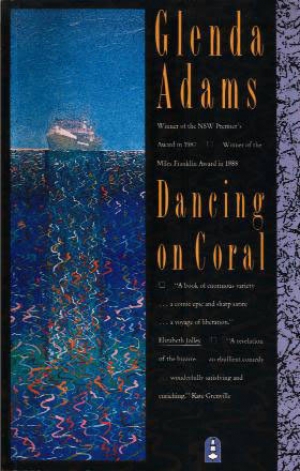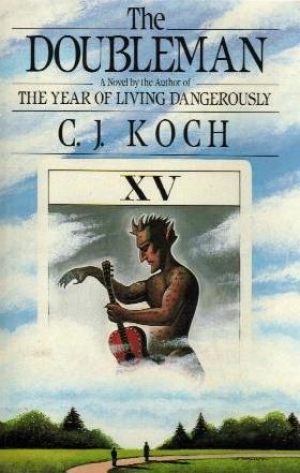Miles Franklin Literary Award Winner
Elizabeth Jolley reviews 'Dancing on Coral' by Glenda Adams
A mixture of courage and an innocent hopefulness seem to be the necessary ingredients for finding rewards and compensations during the painful searching after self-knowledge. Lark Watter, the student daughter of Henry and Mrs Watter, embarks, as so many do, on the voyage of self-discovery.
... (read more)A common approach when talking about women writers is to outline the scope of their work, preferably to demonstrate and affirm its versatility and, implicitly, its value. There’s no doubt that Helen Garner, for example, has suffered under critics’ and reviewers’ insistence that her work deals only with a ...
... (read more)C.J. Koch in this powerful and evocative novel, The Double Man, has applied a psychoanalytic model of human personality to fairytales and the fantastical world of myth: the pursuit of illusion as reality. Its ingenious double life is that of a modern-day fairy tale coupled with the face of 1960s man, paralysed with the despair of his era: its inability to cope with the breakdown of shared values and beliefs. Richard Miller is both the prince of the archetypal fairytale and the prototype of modern man trying to create a private reality out of ancestral beliefs. The Double Man recalls W.B. Yeats’s dread of the ‘rough beast…its hour come round at last’, and the warnings of Goethe who foresaw a time of such chaos: when odd spiritual leaders would emerge and man would turn full circle to find popular truth in ancient myths and legends.
... (read more)Nancy Keesing reviews 'Shallows' by Tim Winton and 'Goodbye Goldilocks' by Judith Arthy
Those who read the gloomy criticisms of modern education by some educationalists might be pardoned for wondering whether any but the most privileged children nowadays can hope to gain mastery of their language or development of their mind and talent. Meanwhile, the talented young blithely make nonsense of crabbed and intolerant age. Paul Zanetti, aged twenty-three, wins the Walkely Award for a political cartoon. Paul Radley, while still in his teens, and Tim Winton, barely older, won Australian Vogel Awards and continue writing with force and imagination.
Winton is now twenty-four. Shallows is his second good novel. It is set in a fictional West Australian whaling town called Angelus. Although I have never been to Albany (where Winton had part of his education), I suspect I might find it recognisable after reading Winton’s devoted and detailed account of Angelus. The time of the action is now, or a year or so ago, but the story ranges through much history. Change is inevitable for whaling ports and industries but whether it should come abruptly or gradually is still debatable.
... (read more)Graham Burns reviews 'True Love and How to Get It' by Gerard Lee and 'Bliss' by Peter Carey
Peter Carey’s first novel, Bliss, will be self-recommending to all admirers of his astonishing short stories. The Fat Man in History and the even better War Crimes mark Carey as the most genuinely original of our storytellers – a fabulist and, in some corners of his imagination, a surrealist of disturbing power. Part of his achievement and, arguably, a sign of his freshness of vision is that his fictions manage so adroitly to slip through the critic’s webs of explication. They tend to resist any simple yielding up of their inner meaning at the same time as they touch the nerves of our general experience and social fears. The central figures of his narratives are typically trapped in the labyrinths of their obsessions or delusions, they are solitaries, often, like the fat men in the title story, both victims and perpetrators of their condition.
... (read more)Rosemary Creswell reviews 'The Impersonators' by Jessica Anderson
As she did so vividly in Tirra Lirra by the River, Jessica Anderson uses a returning expatriate woman to cast fresh eyes on the social and urban landscape of Australia. Here, it is Sylvia Foley who has spent some twenty years in Europe eschewing the comforts and constraints of suburban life, teaching Italian and conducting tours of the British Isles and the Continent. On a whim, she abandons her peripatetic life to return to Sydney for a few months prior to her plan to settle in Rome. Unbeknown to her, her autocratic father, Jack Cornock, is dying and she is immediately suspected by other members of her dislocated family of returning to benefit from the will – which she ultimately does as the recipient of her father’s vindictive gesture to spite his wife. And Sylvia’s ‘family’ is considerable. There is her illiterate mother Molly, now married to Ken, her brother Stewart, and her stepsiblings: Harry, Rosamond, Hermione, and Guy, the children of her father’s second wife, Greta.
... (read more)Rosemary Creswell reviews 'A Woman of the Future' by David Ireland
A Woman of the Future, David Ireland’s sixth novel, is narrated in the first person by a woman, Alethea Hunt. This kind of ‘literary transvestism’ is not new, and in any case is not essentially different from writers who, in third-person narration, inject themselves into the consciousness of a character of the opposite sex. Ireland’s book, however, is remarkable for the way in which a male writer deals obsessively with the sexual thoughts and experiences of a woman. Indeed, it may well incur the ire of feminists that a man should presume, on principle, to understand such experiences. But he handles the role with sensitivity and insight, as he traces a young girl’s awakening sexual consciousness (if it was ever asleep) through to her later contacts with boys and men, most of which are, if not brutalising, at least unsatisfying. Though she claims, even as a small child and much to the satisfaction of her liberated ‘feminist’ parents, that she is without penis envy, she exhibits an extraordinary fascination with the male sexual organ, which is usually described in terms that would make most women want to give up heterosexual intercourse permanently. If these descriptions were meant to be representative of women’s feelings, perhaps one might object, but Alethea Hunt is clearly mad, albeit in the context of a world which is far crazier.
... (read more)On Jessica Anderson, Nene Gare, Michael Wilding, and Damien White
In Tirra Lirra by the River, an elderly woman, Norah Porteou, returns to live in her childhood home in Brisbane after forty years as a ‘London Australian’. The house is empty, so is her life. Norah is a ‘woman whose name is of no consequence’. She is sensitive, vaguely artistic, slightly superior (‘Mother,’ she appeals in a childhood scene, ‘don’t let Grace call me Lady Muck.’) The novel consists of a review of her past, with interruptions from half-remembered neighbours offering curious and resentful help.
... (read more)






